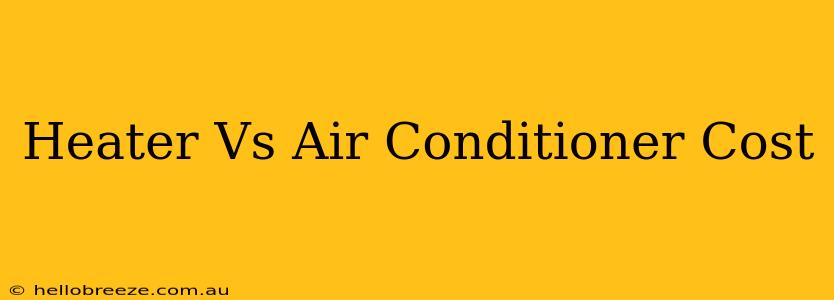Choosing between a heater and an air conditioner often comes down to cost. This comprehensive guide breaks down the initial purchase price, ongoing operational expenses, and long-term considerations to help you make an informed decision. Understanding the nuances of each will significantly impact your energy bills and overall comfort.
Initial Purchase Costs: Heater vs. Air Conditioner
The upfront cost of purchasing a heating and cooling system varies greatly depending on several factors including:
- Type of System: Electric heaters are generally cheaper upfront than air conditioners. However, high-efficiency heat pumps offer a more cost-effective all-in-one solution in the long run (discussed later). The cost of gas furnaces can also be competitive with electric alternatives, depending on your location and installation needs. For air conditioners, window units are the most affordable, followed by portable units, and then central air conditioning systems which are the most expensive.
- Size and Capacity: Larger units with higher BTU (British Thermal Units) ratings cost more. Proper sizing is crucial for efficiency; an oversized unit will cycle on and off frequently, wasting energy and increasing wear and tear.
- Features and Technology: Smart features like programmable thermostats, Wi-Fi connectivity, and advanced filtration systems add to the initial price. Similarly, features like inverter technology in air conditioners improve efficiency but increase the initial investment.
- Installation Costs: Professional installation is essential for both heaters and air conditioners to ensure safety and optimal performance. This adds to the overall upfront cost, and central systems naturally require more extensive installation than smaller units.
In short: While electric space heaters are the cheapest initial purchase, a central air conditioning system will be significantly more expensive upfront. The sweet spot for initial cost balance frequently rests with gas furnaces, if natural gas is available.
Operational Costs: Energy Consumption and Bills
The ongoing operational costs are where the real differences between heaters and air conditioners become apparent:
Electricity Consumption:
- Electric Heaters: These are notorious for high energy consumption, making them costly to operate, especially during extended periods of cold weather. Their efficiency is generally lower than other heating options.
- Air Conditioners: While air conditioners consume electricity, energy-efficient models with high SEER (Seasonal Energy Efficiency Ratio) ratings can significantly reduce operational costs. However, running air conditioning for extended periods, especially in hot climates, can still result in high energy bills.
- Heat Pumps: Heat pumps offer exceptional efficiency, functioning as both heaters and air conditioners. They extract heat from the outside air, even in relatively cold temperatures, making them more energy-efficient than traditional electric heaters.
Gas Heating:
- Gas Furnaces: Gas furnaces are generally cheaper to operate than electric heaters, particularly in areas with affordable natural gas. Their efficiency is typically higher than electric resistance heaters. However, gas prices fluctuate, affecting operational costs.
In Summary: Electric heaters are usually the most expensive to run, followed by air conditioners (depending on usage and efficiency). Gas furnaces, when available, typically prove the most economical, with heat pumps potentially offering the best all-around efficiency if the climate is appropriate.
Long-Term Costs and Lifespan
Consider the lifespan of each system. While a small space heater might only last a few years, a well-maintained central air conditioning or heating system can last 15-20 years or even longer. This longevity significantly impacts the overall cost per year. Regular maintenance is key to extending the lifespan and ensuring optimal efficiency of both heating and cooling systems, thereby reducing long-term costs.
Choosing the Right System for Your Needs
The "best" option ultimately depends on your individual needs, climate, and budget. Factors to consider include:
- Climate: In areas with mild winters, a heat pump might be the most efficient and cost-effective option. Areas with harsh winters might necessitate a gas furnace, while air conditioning is essential in hot and humid climates.
- Home Size: For larger homes, central systems are typically more efficient than individual room heaters or air conditioners.
- Budget: Consider both the initial purchase price and the ongoing operational costs when making your decision.
Careful consideration of these factors will enable you to choose a heating and cooling system that offers optimal comfort and affordability in the long run. Consulting with HVAC professionals can provide personalized advice and ensure you choose the right system for your specific circumstances.

